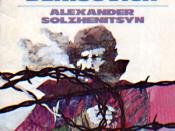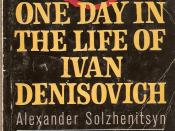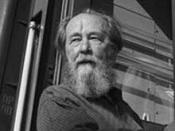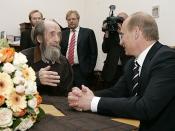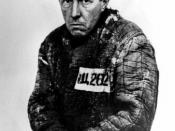Ivan Denisovich Shukov while in the prison finds many ways in which to survive the grueling, painful and bitterly cold special camp. Shukov finds hope in many possessions, his friends and his work and his morality and ethics.
"Here, lads, we live by the law of the taiga. But even here people manage to live. D'you know who are the ones the camps finish off? Those who lick other men's leftovers, those who set store by the doctors, and those who peach on their mates." (Solzhenitsyn 1963:8) This quotation shows how Shukov's believes his morals and ethics will keep him alive in this prison camp. Where as others who are shameless with such low self-respect and dignity that they will eat the leftovers of another prisoner's meal, lazy, or disloyal to their friends will perish from the great hardship.
These three Gulag "Deadly Sins" are all shown in the character Fetiukov.
Fetiukov is a shady character, who has lost his decorum, and the other men in his team have no respect for him because of this.
"When you thought about it, you couldn't help feeling sorry for him. He wouldn't live to see the end of his stretch. His attitude was all wrong." (Solzhenitsyn 1963:) Shukov is so sure that Fetiukov will not last his prison term because he is a man who has lost all his morals which he had before being incarcerated in the camp "Fetiukov was the sort who when he was looking after someone else's bowl took the potatoes from it." (Solzhenitsyn 1963:17) Shukov, however, has strived to keep all his morals and ethics in order to survive. He "would never lower himself like that Fetiukov," (Solzhenitsyn 1963:) Shukov takes pride in the fact that keeping his dignity will keep him alive in the camp and once he is out he will know that he was not reduced to the level of savages. "Then he removed his hat from his clean-shaven head - however cold it might be, he could never bring himself to eat with his hat on." (Solzhenitsyn 1963:17) Even the simple act of taking you hat off while at a table eating is a sign of how much Shukov holds on to his principles.
Shukov has many possessions, which have a special meaning to him. All of these belongings despite being very simple and apparently worthless all help to keep Shukov going each day.
"Shukov pulled his spoon out of his boot. His Little Treasure. It had been with him the whole time in the north, he'd cast it with his own hand out of aluminium wire and it was embossed with the words 'Ust-Izhma 1944'. " (Solzhenitsyn 1963:17) This passage describes the significance of Shukov's spoon. Where the other zeks were content to use the spoons issued by the camp mess hall every meal, Shukov had his own spoon, one that was different and special to him. It is special because he had made it himself and it was his and only his, no one could take it away from him. Another piece of great significance to Shukov is his trowel.
"For a mason a trowel is a serious matter" "One Evening, though, Shukov had fooled the man in the tool-store and pocketed the best trowel; and now he kept it hidden" (Solzhenitsyn 1963:48).
Once Shukov had been issued a good trowel he when to great lengths to make sure he could use it whenever he was assigned to bricklaying. He would hide the trowel in a different place after work each day so that no one, even his team members, can find it and use it. Another belonging that means a lot to Shukov is a broken piece of a hacksaw blade that he found on the work site. Most people in the camp would see it as a useless tool or possibly a weapon, but to Shukov it is a priceless craft knife. Shukov values this little blade so much, he smuggles it into camp.
"What a pity to throw it away. Why, he could make a little knife out of it, very handy for cobbling or tailoring!" (Solzhenitsyn 1963:106) " For that strip of hacksaw he could get ten days in the cells, if they classed it as a knife. But a cobbling knife was money, it was bread." (Solzhenitsyn 1963:107) Getting this blade into camp is, however, difficult and risky with severe consequences. But, to Shukov, this blade can make life so much easier.
Working is also a way Shukov prevails over the hardships of the camp. Shukov likes working because the only time he can stay warm is when he is working. Working also takes his mind off the depression, hunger and cold.
"The numbness would go out of his fingers when he started to work." (Solzhenitsyn 1963:50) Because Shukov likes to work he has become a valued and liked member of the team. Tiurin, the team leader, and Pavlo, the deputy team leader, both like Shukov and he receives many benefits of having friends as leaders.
"Ivan Denisovich, take one for yourself and one for Tsezar." (Solzhenitsyn 1963:67) Shukov on this occasion receives two bowls of food because the deputy team leader likes him.
While in the prison, Ivan Denisovich Shukov finds many ways in which to survive the almost unsurvivable prison camp. Shukov uses his fellow prisoners, his possessions and his ethics.

